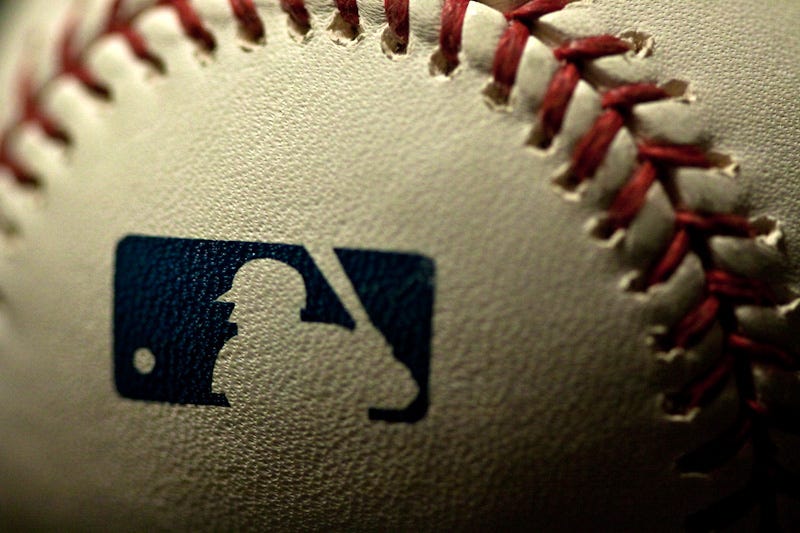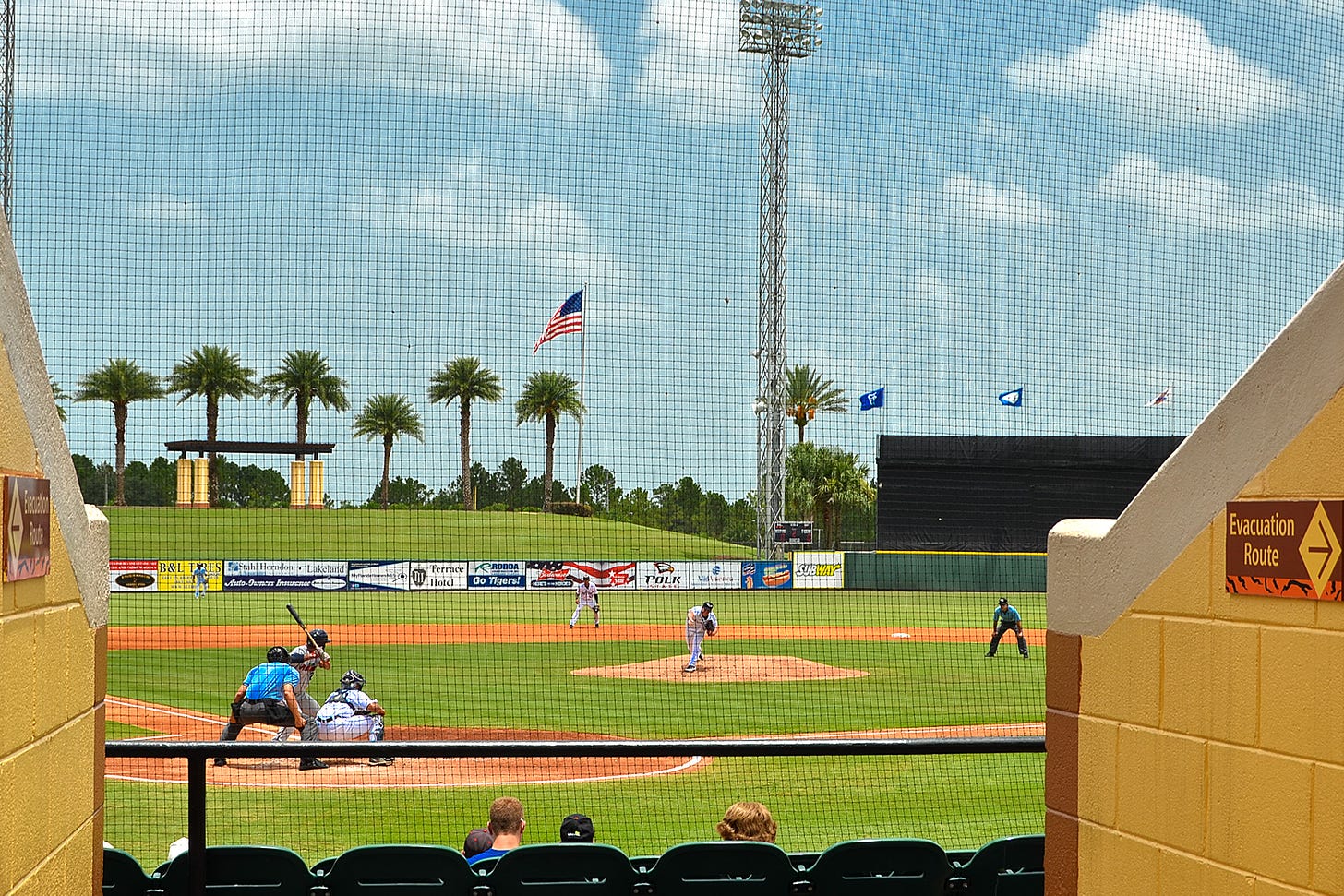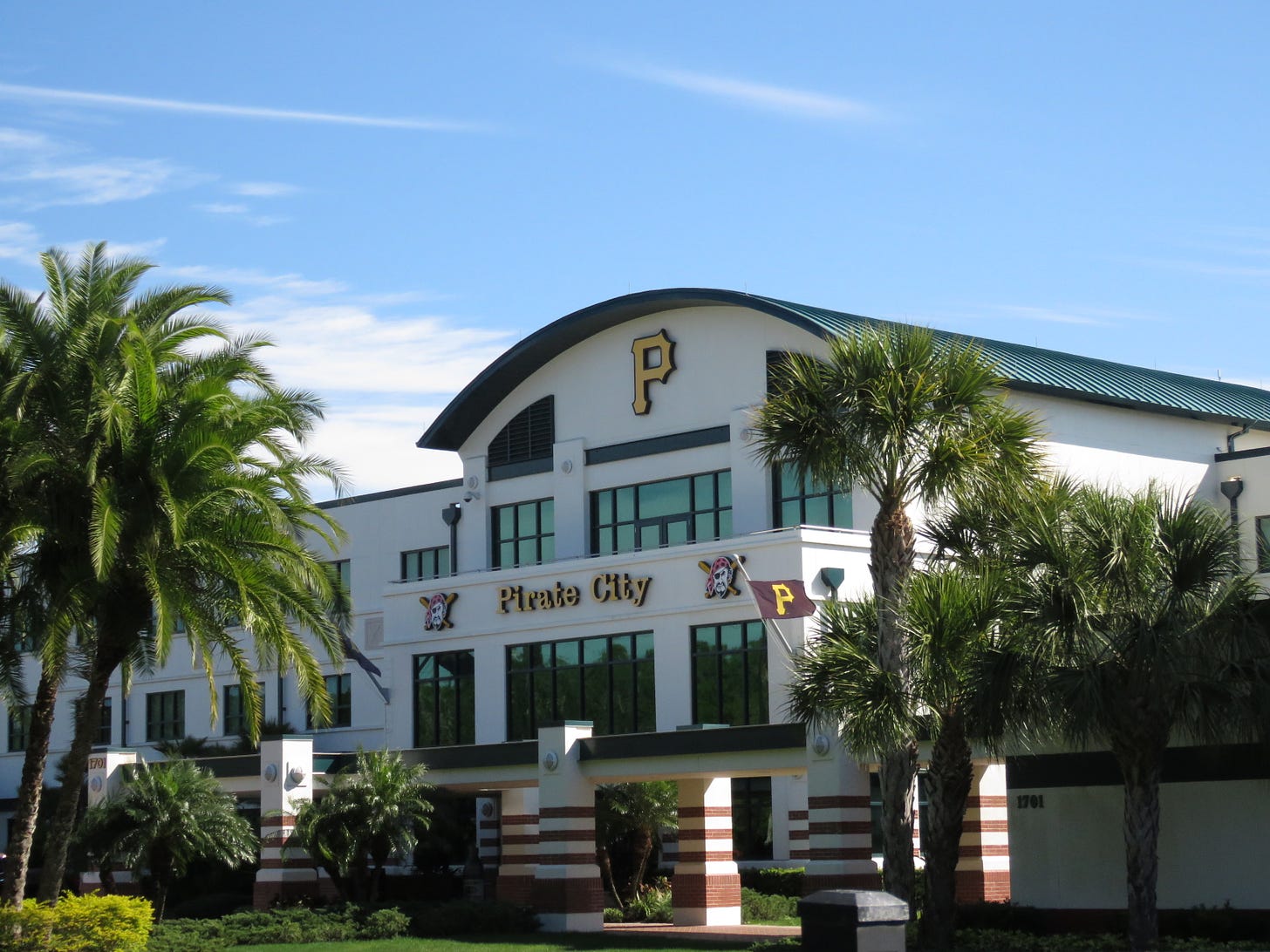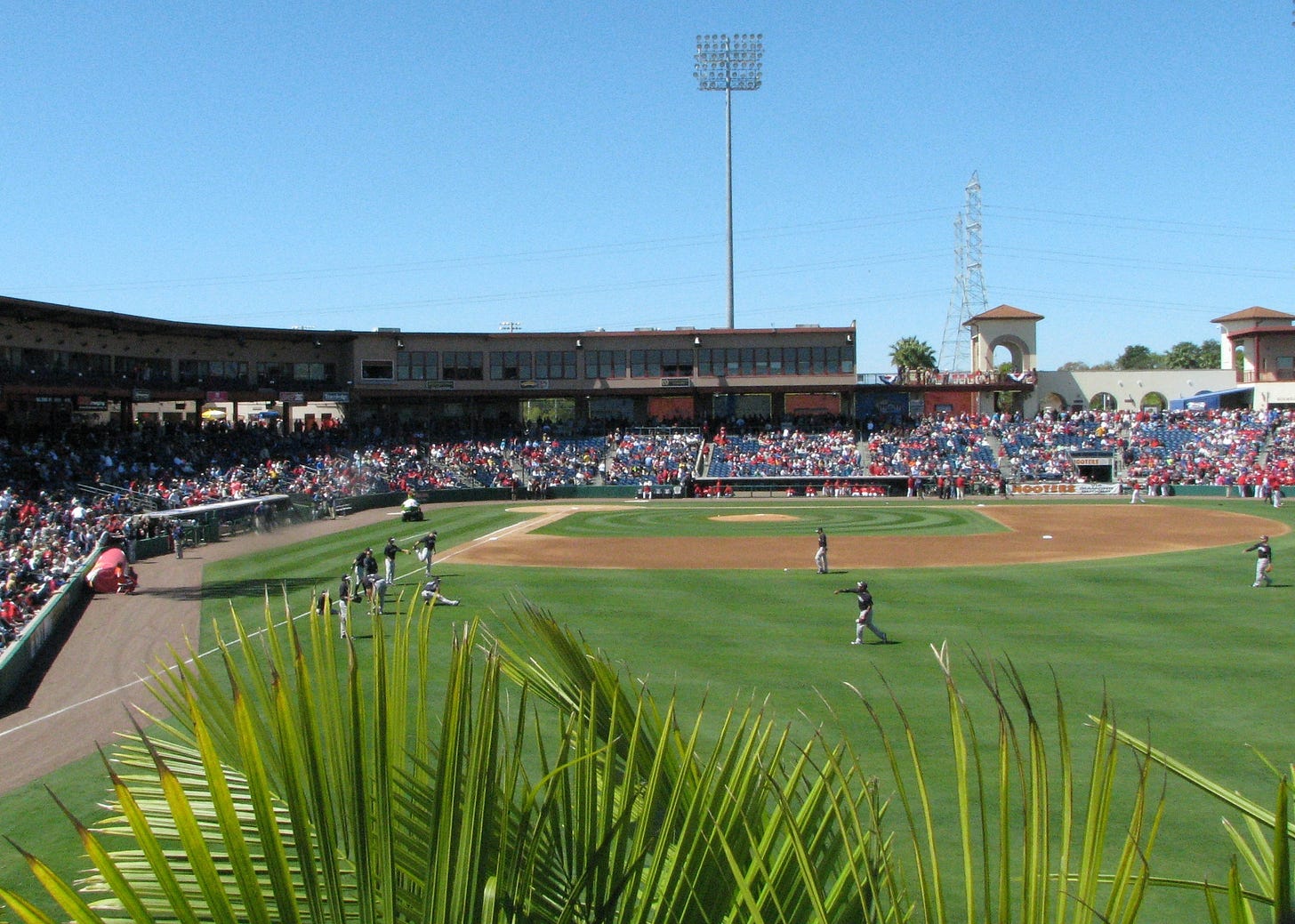Major League Baseball wants Ron DeSantis and the Legislature to carve minor league players out of Florida's minimum wage
MLB is lobbying Florida leaders to deny minor leaguers the right to the state's minimum wage. The billionaire head of a family that owns an MLB team just gave Ron DeSantis a $1 million donation.

This is Seeking Rents, a newsletter and podcast devoted to producing original journalism — and lifting up the journalism of others — that examines the many ways that businesses influence public policy across Florida, written by Jason Garcia. Seeking Rents is free to all. But please consider a voluntary paid subscription, if you can afford one, to help support our work.
Major League Baseball wants Gov. Ron DeSantis and the Florida Legislature to let team owners pay their minor league players less than minimum wage.
The professional baseball league is lobbying Florida’s elected leaders for legislation that would cut baseball players out of the state’s minimum-wage law. That would allow MLB teams — all of which are owned by billionaires or near-billionaires — to get away with making minor leaguers work without salaries during key periods like spring training and fall instructional leagues.
MLB teams have historically refused to pay players outside the league’s roughly six-month regular season. That forces many minor leaguers — all of whom must practice and train year-round and most of whom will never actually make it to the big leagues — to survive on sub-poverty salaries that sometimes work out to less than $5,000 a year.
But last year, the league and its owners agreed to pay $185 million to settle a class-action lawsuit brought by minor leaguers who said MLB’s pay practices violated wage and hour laws around the country — including in Florida.
MLB tried to argue during that litigation that players were already exempt from the state minimum wage in Florida, where half of the league’s 30 teams have spring training and minor-league development facilities. But the judge presiding over the case rejected the league’s claim.
So now the baseball industry is turning to DeSantis and Florida’s Republican-controlled Legislature for help.
To muscle the minimum-wage carveout through Tallahassee, MLB has hired a lobbying firm run by a top fundraiser for DeSantis, the Republican governor who is preparing a run for president. The league’s roster of lobbyists includes DeSantis’ former chief of staff.
The legislation was filed on Feb. 16. The next day, records show, DeSantis received a $1 million contribution from Joe Ricketts, the billionaire patriarch of the family that owns MLB’s Chicago Cubs.

The owners of the San Francisco Giants, St. Louis Cardinals and Miami Marlins have also made five- or six-figure donations to DeSantis in the past.
In a written statement, Major League Baseball said it simply wants to “clarify” that baseball players playing in Florida aren’t entitled to the state’s minimum wage.
“The intention is merely to remove all doubt and explicitly clarify the existing Florida law,” the league said.
But Garrett Broshuis, a former minor league pitcher and the attorney who led the class-action suit on behalf of all minor leaguers, accused MLB and its owners of trying to “subvert” a fundamental protection for American workers.
“We’re talking about the same laws that Walmart and McDonald’s comply with on a daily basis,” Broshuis said. “There’s no reason they can’t comply with these laws when it comes to minor league baseball players.”
The Governor’s Office would not say whether DeSantis would sign the bill if it passes the Legislature. The Chicago Cubs declined to comment. Ricketts could not be reached for comment.
The lobbying campaign in the Florida Capitol appears to be part of a nationwide effort by MLB and its team owners to cut minor league players off from state-level minimum wage protections. Earlier this month, for instance, the Republican attorney general of Texas issued a legal opinion declaring baseball players ineligible for Texas’ minimum wage. MLB has also lobbied for a minimum-wage exemption in Arizona.
Major League Baseball did a record $10.8 billion in revenue last year, according to Forbes. The league’s 30 franchises have a combined value of more than $60 billion. Its principal team owners have a collective net worth of more than $100 billion.
Poverty pay in an $11 billion business
MLB’s Florida legislation gets its first hearing on Monday afternoon — one day before the Legislature gavels open its annual 60-day lawmaking session. But this is part of a battle that dates back nearly a decade.
As recently as just a few years ago, most minor leaguers were earning between $3,000 and $7,500 a year. They still regularly work between 50 and 70 hours a week during the regular season without overtime. And they are forced to work essentially for free during spring training and fall instructional leagues, which are roughly month-long sessions that teams hold at their spring training sites once the regular season has ended.
Players have crammed five or six to a small apartment — sometimes with their wives and kids — sleeping on air mattresses and couches instead of beds.

That’s according to the federal class-action suit that was first filed by some current and former minor leaguers back in February 2014.
The suit accused MLB and its 30 teams — who are exempt from federal antitrust laws — of violating federal minimum-wage and overtime laws. But it also accused them of breaking state-level wage and hour laws in eight states, including Florida.
MLB tried to torpedo the suit by lobbying up in Washington, D.C.
In 2018 — after three years of lobbying and nearly $4 million spent on lobbyists — the baseball industry got Congress to sneak a provision into page 1,967 of a 2,322-page, must-pass spending bill that explicitly exempted baseball players from federal minimum wage and overtime laws.
Baseball lobbyists branded it the “Save America’s Pastime Act,” in part because they claimed it would keep minor league baseball — a nostalgic tradition in many smaller communities across the country — economically viable. Two years later, MLB cut 40 minor league teams.
The new federal law made it crystal clear that, at least going forward, minor league baseball players were not entitled to the federal minimum wage.
But MLB tried to stretch the new law even further.
Back in court, where MLB was still defending itself against the suit brought by minor league players, attorneys for the league claimed that, by changing the federal minimum wage law, Congress had just changed Florida’s minimum wage law, too.

Their argument rested on a small provision in Florida’s nearly 20-year-old minimum wage statute, which says that only workers who are entitled to the federal minimum wage are eligible to receive Florida’s higher state wage.
Since baseball players could no longer claim the federal minimum wage, MLB’s lawyers argued, they couldn’t claim the Florida minimum wage, either.
The federal judge overseeing the case didn’t buy it. In a wide-ranging ruling issued last March that resolved a host of key legal arguments in the long-running lawsuit, Judge Joseph Spero of the Northern District of California ruled that an act of Congress amending the federal minimum wage did not automatically alter Florida’s minimum wage, too.
A few months later, MLB and its owners agreed to pay $185 million to settle the case — which included $120 million in payments for minor leaguers.
As part of the settlement, Major League Baseball also said it would no longer prohibit its teams from paying players during spring training — though teams could still choose not to do so.
MLB has recently raised minor league pay somewhat. But most minor leaguers still earn less than $15,000 a year — which means they fall below the federal poverty line.
A ‘sneaky’ attack in Tallahassee
That settlement was approved last August. Less than six months later, Senate Bill 892 and House Bill 917 surfaced in the Florida Legislature.
The legislation would add just two words to Florida’s minimum-wage statute — neither of which is “baseball.” But the effect would be to have the state adopt the “Save America’s Pastime Act” and thus permanently freeze baseball players out of Florida’s minimum wage.
Broshuis, the former minor league pitcher who now represents players as an attorney, called it a “sneaky” approach to lawmaking.
Major League Baseball “succeeded at the federal level by tacking on an exemption in the dark of night to an omnibus spending bill, without any debate whatsoever,” Broshuis said. “And now they’re attempting a similar tactic in Florida, by trying to pass something that doesn’t even refer to baseball players but is clearly aimed at changing the law in their favor.”
The state lawmakers sponsoring the bills — Rep. Brad Yeager (R-New Port Richey) and Sen. Jonathan Martin (R-Fort Myers) — did not respond to requests for comment.

In its statement, MLB said it would make little sense to treat baseball players like sta hourly workers. “It serves nobody for minor league players to be treated like clock-punching workers who can only access the facilities at managed, scheduled times,” the league said.
The Florida legislation could deliver a gut punch to minor leaguers in another way, too.
Last fall, minor leaguers voted to unionize. The players are now negotiating with owners for their first labor contract — and pay during spring training and fall instructional leagues is believed to be one of the issues on the bargaining table.
Cutting minor leaguers off from base-level wage protections in one of the baseball industry’s biggest states could give owners more leverage during those contract talks.
MLB insists the legislation has nothing to do with its collective bargaining negotiations. The players union did not respond to requests for comment.
Correction: A previous headline in this story incorrectly referred to Joe Ricketts, the billionaire founder and former CEO of TD Ameritrade, as the owner of the Chicago Cubs. The Ricketts family owns the Cubs.





DeSicko is a crook and must be held accountable.
It figures.